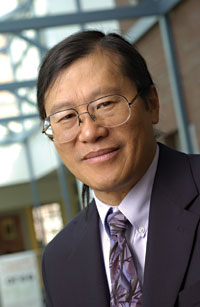Vital Signs
Building humanity, empathy, and emotion into the curriculum
"We have curriculum to learn sciences, but not to develop empathy skills, relationship-building skills," says Tommy Lee Woon, Dartmouth's dean of pluralism and leadership. So Woon has developed a DMS elective— titled "Building Our Humanity: Culture, Emotions, and Medicine"— that addresses areas typically neglected in medical school coursework. He pioneered a similar course at Stanford before coming to Dartmouth in 2002.
Feelings: The DMS course emphasizes physician self-care, emotional literacy, and cultural versatility. Students are encouraged to disclose their innermost feelings, to gain insight into how to be vulnerable, and to learn how to create emotional safety for themselves.

|
|
Tommy Lee Woon |
"Students learn how to cry in my class," Woon explains. "They learn to feel fear, too—that trembling, shaking kind of fear."
Says third-year medical student Tara Thacker, who took the course in the fall, "It focuses on the concept of being able to discharge your emotions in a safe setting, so that [they don't] become part of your interactions with others."
Small groups: The course, which is limited to 10 students, puts students in pairs or small groups to develop and practice more effective listening and attending skills; a better understanding of emotional healing; an ability to respond to emotions; an ability to maintain one's humanity; a commitment to eliminating health-care disparities and prejudices; and a professional dedication to equity and diversity in medicine.
"It's helpful to have a place to discuss feelings," Woon says. By coming to terms with their feelings, he hopes that students will become more compassionate physicians, will be better able to relate to patients from different cultures, and will be more responsive to patients who may be in pain or dying.
"I'm hoping the students will graduate from this program and become leaders in promoting a more relationship-centered kind of medicine," explains Woon.
Relationship skills: The course appears to be working. DMS faculty members have noticed a marked improvement in the relationship skills of the students who have taken it so far. And some of the students themselves have even commented on the effect the course has had.
"I've been applying many of the skills I learned as a 'counselor' to my patients," explains Thacker. "It has enabled me to get excellent histories, establish rapport, and in general will help me to provide better care for my patients."
Laura Stephenson Carter
